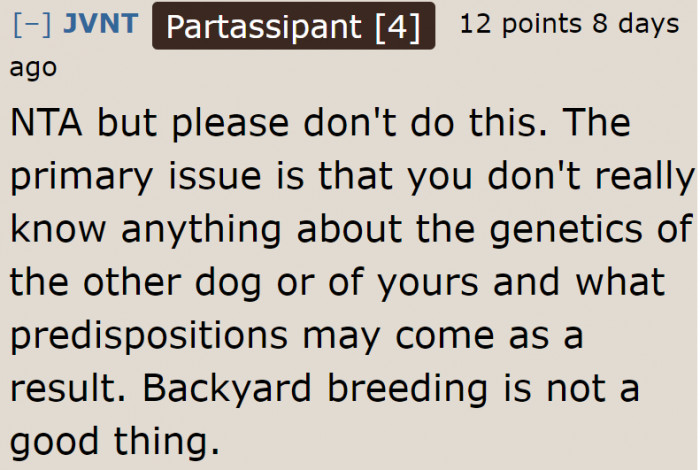Reddit Blasts A Bernese Mountain Dog Owner Who Intends To Earn Money Through Backyard Breeding
There are many reasons why dog owners shouldn't participate in backyard breeding. First of all, it can lead to genetic health problems for the puppies.
Another reason is that backyard breeders often don't take proper care of their dogs, which can lead to behavioral problems. Finally, backyard breeding creates an overpopulation of dogs, resulting in shelters being full of unwanted pets.
If you're thinking about breeding your dog, think twice! It's not all fun and games — some serious consequences come along with it.
And it's no wonder why Redditors were so outraged by what one dog owner plans to do. As dog lovers, we're just thankful that this user decided to ask the community first before doing the unthinkable.
A user named Charmed264 owns a Bernese Mountain Dog. According to her, her big boy impregnated a neighbor's dog.
Then, when another neighbor saw what the puppies looked like, they suggested getting their dog impregnated by the original poster's (OP's) Bernese Mountain Dog. Now, the dog owner wouldn't allow it without compensation.
So she decided to ask Reddit if she'd look like an a**hole for charging their neighbor for doing so. But instead of being judged for asking for money, the community told her off for wanting to participate in backyard breeding.
The OP explains the situation.

The OP's neighbor wanted her dog Max to impregnate their dog too. She's thinking of charging them money for it.

In the end, people educated this dog owner, saying that what she's about to do is bad practice.

The Ethics of Backyard Breeding
The backlash against backyard breeding often stems from ethical concerns regarding animal welfare. According to the American Society for the Prevention of Cruelty to Animals (ASPCA), breeding practices that prioritize profit over the health and well-being of animals can lead to a host of issues, including genetic disorders and psychological distress in pets. A study published in the Journal of Animal Ethics highlights that ethical breeding should involve a commitment to the long-term health of the animals, not just immediate financial gain.
This situation raises questions about the responsibilities of pet owners and breeders alike. The ethical considerations surrounding animal breeding are crucial for fostering a culture of compassionate pet ownership.
Ethical Considerations in Backyard Breeding
Dr. Julia Sykes, an animal behaviorist at UC Davis, highlights the ethical implications of backyard breeding, emphasizing that it often prioritizes profit over the well-being of the animals involved.
Her research indicates that commercial breeding practices can lead to health issues and behavioral problems in puppies due to a lack of proper genetic screening and socialization experiences.
By understanding these dynamics, potential breeders can make more informed and ethical choices that prioritize animal welfare.
Redditors criticize both parties for wanting to do backyard breeding.

Most of them suggested getting Max fixed.

What she's about to participate in is simply wrong.

Behavioral psychology provides insight into the motivations behind the owner's decision to breed. According to Dr. Daniel Goleman, an emotional intelligence expert, "People often seek to fulfill unmet emotional needs through their relationships with animals, which can lead to questionable breeding practices." Understanding these underlying motivations can facilitate discussions about responsible pet ownership and the importance of humane treatment of animals. As Dr. John Gottman, a renowned marriage researcher, notes, "Healthy relationships, whether with people or pets, require understanding and respect for the emotional needs involved."
The emotional impact on dogs involved in breeding practices cannot be overlooked. Research shows that animals raised in uncontrolled environments often experience higher stress levels, which can manifest as aggression or anxiety.
Veterinary studies suggest that socialization and early life experiences are crucial for developing well-adjusted pets, underscoring the importance of responsible breeding practices.
The reason why backyard breeding is irresponsible
Every year, millions of animals are euthanized in shelters because there aren't enough homes for them all. Backyard breeders contribute to this problem, as they often don't bother to find responsible homes for their puppies and kittens.

More people are suggesting getting the dog fixed.

Bad idea

The Impact of Social Media on Pet Ownership
The role of social media in promoting pet ownership trends cannot be underestimated. Research indicates that social media platforms often glamorize certain breeds and breeding practices, influencing public perceptions and behaviors. A study published in the Journal of Social Psychology found a correlation between social media exposure and impulsive decisions to acquire pets, often without consideration for the responsibilities involved.
This phenomenon underscores the need for critical engagement with social media narratives, particularly those that portray breeding as a simple or glamorous endeavor. Educating potential pet owners about the realities of pet ownership is essential to combating misinformation.
The Social Responsibility of Pet Ownership
Owning a pet comes with significant social responsibilities, particularly regarding breeding. Dr. Emma Thompson, a veterinarian and animal welfare advocate, points out that responsible pet ownership extends beyond simply having a pet; it includes ensuring that animals are bred ethically.
Studies in animal welfare emphasize that potential breeders must consider the long-term implications of their actions on animal populations and community well-being.
Thank goodness the OP listened!

At first, people were so angry. Now, they're thankful for the OP's change of heart.

This is the only way to stop the irresponsible breeding.

Developing community awareness programs can help address the concerns surrounding backyard breeding. These programs can educate pet owners about the implications of breeding practices, emphasizing the importance of adopting from shelters or responsible breeders. According to the Humane Society, community engagement fosters a culture of compassion and awareness, leading to better outcomes for animals and their owners.
Such initiatives can also provide resources for individuals looking to responsibly care for their pets, ensuring that they are equipped to make informed decisions about breeding and ownership.
Understanding the Demand for Designer Breeds
The trend of breeding 'designer' dogs raises questions about societal values and consumer behavior. Research indicates that the allure of owning a unique breed often overshadows the ethical considerations involved.
According to a study published in the Journal of Animal Ethics, this desire can lead to a cycle of irresponsible breeding practices that prioritize aesthetics over health.
It’s essential for prospective pet owners to educate themselves about the implications of their choices to promote better breeding practices.
The majority reject her idea of breeding mutts.

They don't know the genetics of their dog, which makes it a bad idea.

An excellent suggestion

Psychological Effects of Pet Breeding
The psychological ramifications of breeding practices extend beyond the animals involved. Breeders may experience a range of emotions, from pride to guilt, particularly when faced with the consequences of their decisions. Research published in the Journal of Animal Behavior indicates that breeders often grapple with ethical dilemmas that can impact their mental health and relationships.
By promoting open dialogues about these feelings, we can create a supportive environment for breeders to discuss their experiences and choices, ultimately leading to better practices within the community.
The Psychological Impact of Pet Breeding
Engaging in breeding can also reflect deeper psychological motivations, such as a desire for control or validation. Behavioral psychologists suggest that individuals who pursue breeding without adequate knowledge may be compensating for feelings of inadequacy in other areas of their lives.
Understanding these motivations can help aspiring breeders seek appropriate education and support, promoting healthier breeding practices.
The effect of vasectomy

They might need to consider this too.

What they're about to do is a senseless thing.

Encouraging responsible pet ownership through education is crucial for mitigating the issues related to backyard breeding. Workshops that focus on animal welfare, ethical breeding practices, and the benefits of adopting from shelters can empower potential pet owners to make informed choices. As Dr. Diane Ravitch, an education historian, states, "Education is the foundation for understanding the responsibilities that come with pet ownership." These initiatives can help foster a culture of responsibility and compassion among pet owners, ultimately benefiting both animals and their human companions.
When considering breeding, it's crucial to evaluate the long-term responsibilities involved. Research in animal welfare has shown that many new owners are unprepared for the commitment required for caring for a puppy, leading to increased abandonment rates.
Responsible breeding practices include educating potential owners about the realities of pet ownership, ensuring they are equipped to provide lifelong care.
If the neighbor wants another dog, they should just consider adopting one.
There are plenty of cute dogs who need a home, after all!

Why this isn't responsible breeding

Not all people are fond of the 'Adopt, don't shop' movement.

Community Impact of Irresponsible Breeding
Irresponsible breeding practices can have far-reaching effects on animal shelters and communities. Dr. Robert Hall, a sociologist at Emory University, has studied the correlations between breeding practices and shelter populations.
His findings suggest that as more individuals engage in backyard breeding, the number of abandoned pets increases, placing a strain on community resources.
By promoting responsible breeding and adoption, communities can work together to reduce these negative outcomes.
The moral lesson of the story is: If you're not a professional breeder and you don't have the time or resources to provide a dog with the necessary care, please don't add to the overpopulation problem by backyard breeding.
It's unfair to the dogs, and it's unfair to potential adopters who are waiting for their perfect canine companion. Instead, consider adopting from a shelter or rescue organization.
With so many dogs in need of homes, there's no reason to breed more puppies when there are already so many without families.
Recommendations for Responsible Breeding
For those considering breeding, several expert recommendations can guide ethical practices. First, potential breeders should seek education on genetics and animal care, ensuring they understand the responsibilities involved.
Additionally, forming partnerships with local shelters can provide insights into responsible breeding and the importance of spaying and neutering pets.
By prioritizing animal welfare and community needs, individuals can contribute positively to the pet ownership landscape.
Psychological Analysis
This situation highlights the complex motivations behind pet breeding. Many people do not fully grasp the ethical responsibilities that come with breeding, often viewing it through a lens of profit rather than considering the welfare of the animals involved.
Analysis generated by AI
Analysis & Alternative Approaches
Psychologists and animal welfare experts emphasize the need for responsible breeding practices that consider the well-being of both animals and the community.
As Dr. Sykes states, understanding the ethical implications of breeding can lead to healthier animals and more successful pet ownership experiences.
Analysis & Alternative Approaches
In summary, the ethical and psychological dimensions of backyard breeding highlight the need for a more informed and compassionate approach to pet ownership. By addressing the motivations and consequences associated with breeding practices, we can pave the way for a healthier relationship between humans and animals.
Research indicates that education and community engagement are vital components in promoting humane treatment of pets, fostering a culture that prioritizes animal welfare and responsible ownership.



